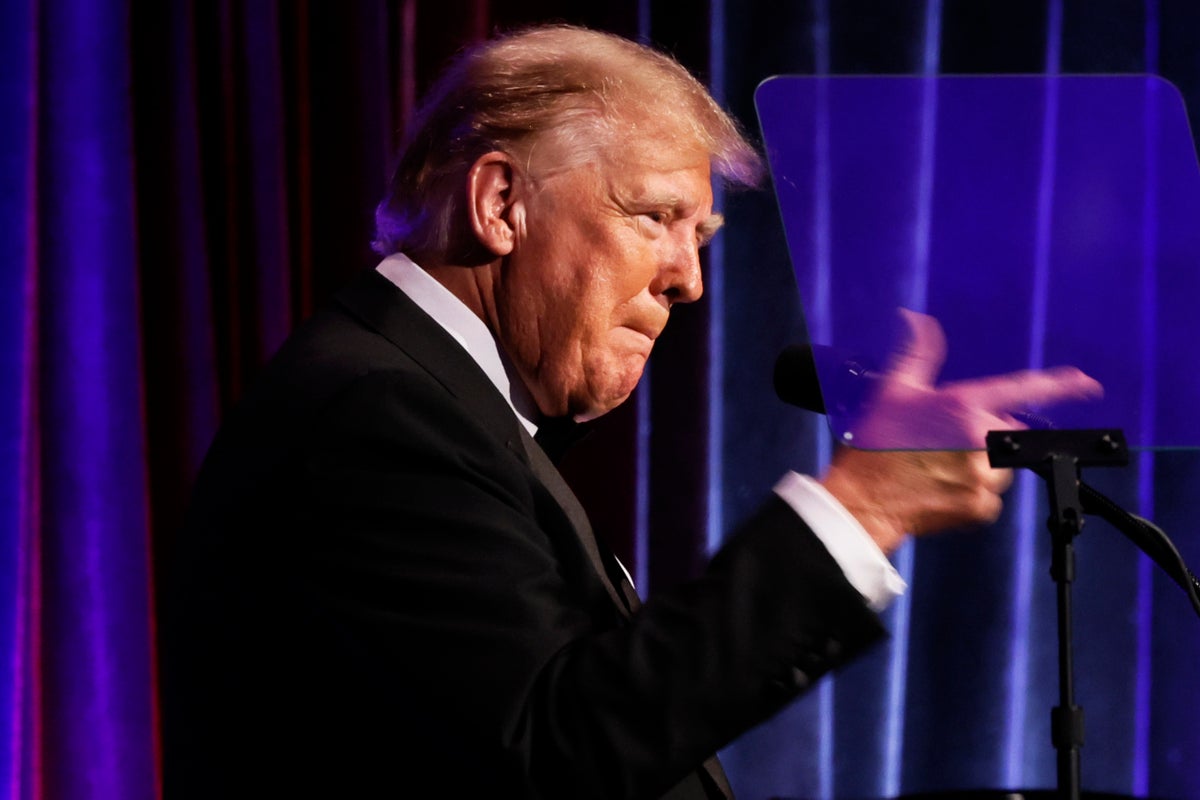
As Donald Trump continues to face vocal condemnations after refusing to deny that he would be a “dictator” during his second term, the former president is turning to a familiar excuse to explain his eyebrow-raising remarks.
The ex-president has been at the centre of a small firestorm since his appearance last Wednesday on Fox News for a town hall-style interview with Sean Hannity, his counter-programming for the fourth GOP presidential debate. During that interview, a visibly flustered Hannity was left sputtering after Mr Trump’s off-colour quip about whether he would act with authoritarian tendencies if returned to power.
“Under no circumstances, you are promising America tonight, you would never abuse power as retribution against anybody?” Hannity asked the former president, kicking off the exchange.
“Except for day one,” Mr Trump shot back. “I want to close the border, and I want to drill, drill, drill.”
As Hannity struggled to reply and get a straight answer from Mr Trump, the former president turned to the audience, and ridiculed the Fox host: “I love this guy ... he says, ‘You’re not going to be a dictator, are you?’ I said: ‘No, no, no, other than day one. We’re closing the border and we’re drilling, drilling, drilling. After that, I’m not a dictator.’”
On Monday, Mr Trump made his first attempt at seriously walking back the comments.
Writing about coverage of his appearance in The New York Times, Mr Trump said in a Truth Social posting that the Times’s Peter Baker “just wrote, in a major, front page story, that I want to be a Dictator, but doesn’t mention it was said in a joking manner, and completed with “but only for a day, because I’m going to close the Border, and DRILL, DRILL, DRILL,” a much different attitude and meaning!”
That post was in itself Mr Trump’s second attempt at responding to Mr Baker’s article, which examined the growing discussion in American political circles about whether Mr Trump presents a real danger to the sanctity of the Constitution and the future of the Republic. His first response came over the weekend at the New York Young Republicans annual gala. During that speech, however, he appeared to double down on his desire for a kind of fantasy-esque authoritarian system that would end after the first day of his presidency concluded.
“[Peter] Baker today in The New York Times said that I want to be a dictator. I didn’t say that. I said I want to be a dictator for one day. You know why I wanted to be a dictator? Because I want a wall, and I want to drill, drill, drill,” said the ex-president on Saturday.
His latest explanation was a familiar return to a refrain that has been the former president’s get-out-of-jail-free card since 2016. Journalists have lost count of the number of times Mr Trump has used some variation of “I was just joking” to walk back controversial remarks that ended up getting him in trouble. His most infamous use of this strategy came during the 2016 election when his campaign appeared doomed by the release of footage from Access Hollywood wherein Mr Trump made sexually degrading comments about women. Then-candidate Trump’s explanation of the exchange as “locker-room” talk would go on to set the bar in terms of his ability to wriggle out of political debacles.
Throughout the Trump presidency, those excuses kept coming.
In several cases, remarks that betrayed a potential gaping lack of knowledge on Mr Trump’s behalf were later explained away as “sarcasm” by then-president Trump. One more humorous example occurred during the early days of Covid-19, when Mr Trump appeared alongside distinguished medical professionals at the White House and suggested injecting Americans with cleaning agents like bleach to kill the virus. He would later say that he was merely "asking a very sarcastic question to the reporters in the room".
Mr Trump did the same later in 2020 when he attempted to explain why he had repeatedly referred to the Nobel Prize as the “Noble Prize”.
“Does anybody get the meaning of what a so-called Noble (not Nobel) Prize is, especially as it pertains to Reporters and Journalists? Noble is defined as, ‘having or showing fine personal qualities or high moral principles and ideals.’ Does sarcasm ever work?” he wrote on Twitter at the time.
And then there was the moment at a press conference in 2016, when Mr Trump, addressing the cameras, appeared to urge Russia’s government to release emails he suggested it had stolen from Hillary Clinton’s private email server — the emails had actually just been deleted.
“It was all said in a joke,” he would later tell the Conservative Political Action Conference (CPAC).
Jokes or not, Mr Trump’s words have ignited a serious debate within American politics about whether a second Trump presidency would do real harm to America’s system of government. Other reports in recent weeks have added fuel to the fire with descriptions of “Project 2025”, a roadmap for a far-right presidency being spun up by allies of the former president and a slew of right-wing think tanks.
Among the president’s supposed plans for a second term include one glaring position that would perhaps irreversibly alter the structure of the federal government and unmistakably shift it towards authoritarianism: A planned erosion of the traditional independence of America’s federal law enforcement.
According to reports in The Washington Post and other publications, allies of Mr Trump are hoping to hammer through policy changes at the Department of Justice that would put the agency at the president’s beck and call; Mr Trump publicly has vowed to use the agency to go after Joe Biden and his family for crimes that House Republicans have sought to prove the existence of (without success) for several months.
The ex-president himself remains under four felony indictments and is charged with more than 90 counts of criminal activity.







